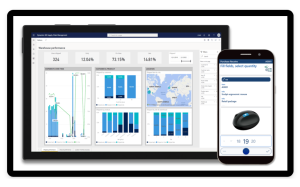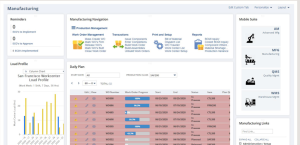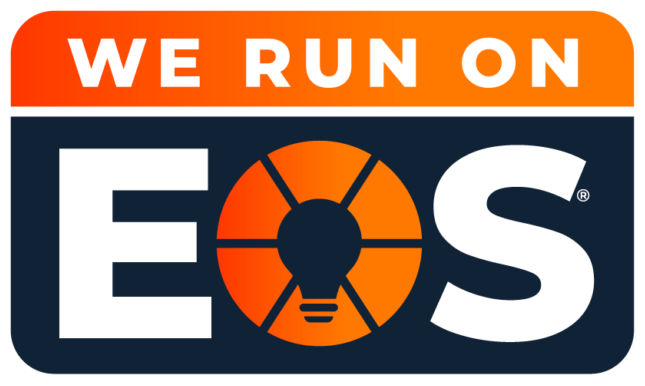New Supply Chain Technologies Helping Eliminate Operations Headaches
New technologies are disrupting the supply chain industry, but the disruptions aren’t unwelcome. As previously noted—see Louisville Geek’s spring 2023 article How Is Technology Shaping The Future Of Logistics—robotics and process automation, artificial intelligence (AI), machine learning (ML), blockchain, analytics, Internet of Things connectivity, cloud computing and augmented reality are all impacting supply chain management, logistics coordination, inventory management, order administration, workflow optimization, electronic data interchange (EDI) communications and warehousing, among other operations.
Improved forecasting capabilities and efficiency and productivity gains are among the many benefits of technological innovation within the supply chain industry. Other resulting advantages include improved visibility into each step of supply chain operations, lower costs due to optimized transportation routes and improved inventory forecasting and enhanced customer satisfaction due to accurate real-time tracking and order status. Still another supply chain benefit arising from technological innovation is improved collaboration between manufacturers, suppliers, transportation providers and customers.
Organizations that haven’t yet explored testing or employing new disruptive supply chain technologies should begin fast-tracking efforts. Gartner predicts that, by 2026, more than 75 percent of commercial supply chain management app providers will offer analytic, AI and data science capabilities and that those firms failing to merge specific supply chain initiatives will be at risk of losing value.
While numerous technologies are enhancing and improving logistical operations, a handful in particular stand out. They include:
- Blue Yonder Supply Chain Operating System
- e2open Connected Supply Chain Software Platform
- Microsoft Dynamics 365 Supply Chain Management
- Oracle NetSuite Supply Chain Management
- SAP Supply Chain Management Software
Here’s a look at each.
Blue Yonder Supply Chain Operating System
Focused on providing supply chain and fulfillment solutions for retailers, manufacturers and logistics companies, Blue Yonder’s supply chain software and services assist fulfilling each step of the process from planning to delivery. The provider’s apps and solutions help unify supply chain and commerce data to identify new sales opportunities and operational efficiencies, automate processes, enhance control and improve administration.
The company’s control tower platform features AI and ML capabilities that help users better understand real-time information being collected throughout order taking, production, warehousing and transportation processes. The software, available in various versions, also assists collaborating with users and various partners, suppliers and vendors.
Known as Supply Chain Control Tower (SCCT) solutions, such centralized software applications analyze information collected from throughout the entire supply chain to produce multiple benefits. As with other SCCT apps, Blue Yonder’s platform assists improving planning and visibility, recognizing and avoid risks including those resulting from weather disruptions and supplier performance problems, surfacing more real-time information to improve decision making, increasing efficiency and productivity and subsequently lowering expenses.
Specifically, SCCTs such as Blue Yonder’s Luminate platform assist companies by improving demand forecasting by collecting and processing historical sales information, customer preferences and market trends to enable better understanding the meaning of that data. Inventory management also benefits, in that the software helps logistics professionals more accurately predict required inventory and prevent expensive overruns or missed opportunities due to shortages. The software also monitors order flow to spot production and fulfillment issues quickly and confirm orders are shipping on schedule. SCCTs also help address common problems associated with transporting goods, including by optimizing trucking and transportation routes and factoring such elements as traffic, fuel and weather when designing and scheduling distribution routes and schedules.
SCCT pricing, including for Blue Yonder apps, vary widely depending upon a number of factors, such as the volume of transactions, the number of sites and the various components a company licenses and employs. Other factors that impact cost include whether the software is licensed to run on equipment the customer provides and maintains or by cloud-computing infrastructure provided and maintained by the software developer.
For more information on Blue Yonder’s Luminate platform, or to sign up for a free demonstration, complete the provider’s webform online.
e2open Connected Supply Chain Software Platform
e2open often works with large enterprises needing to produce, sell and transport products. Recognizing traditional supply chain complexities and the greater dependencies suppliers pose, e2open set as its mission enabling cost-effective and environmentally sound production and distribution of goods and services. The provider subsequently offers platforms and solutions assisting with supply chain channel collaboration, logistics planning and execution and fulfillment administration.
As with other SCCT “control tower” solutions, the company’s AI-powered software identifies important data and trends to assist supply chain decision making and enhances collaboration between users, transportation partners, production sources and order fulfillment parties. From collaboration at the manufacturing stage to assisting with sales orders and invoicing, from transportation planning and administration to logistics tracking and even customs processes and optimization, e2open’s supply chain solutions fulfill important roles, particularly for larger organization’s producing and shipping goods internationally.
For more information on e2open, visit the company’s website to start a chat or send the provider’s customer support staff a question.
Microsoft Dynamics 365 Supply Chain Management Platform
An example of both an SCCT and Manufacturing Execution System (MES) software app, which serves to enhance production processes by integrating and applying data and information from multiple manufacturing systems, is the Microsoft Dynamics 365 Supply Chain Management platform. The software produces a single view of the overall supply chain enabling users to monitor, administer and optimize manufacturing, shop floor management, order taking, inventory management, warehousing, shipping and transportation operations. 
Microsoft Dynamics 365 Supply Chain Management software assists in streamlining warehouse operations, among other tasks, by enabling more effective collaboration with automated material handling partners and supporting customizable workflows while also offering mobile applications for administering supply chain operations when outside the office.
While Microsoft’s Dynamics platform addresses a variety of Enterprise Resource Planning (ERP) needs, including customer service, finance and sales and marketing functions, the platform also fulfills manufacturing, logistics, transportation and supply chain responsibilities. Whether employing Microsoft Dynamics 365 to assist traditional supply chain tasks or integrate with third-party MES apps, the platform’s MES capabilities assist optimizing manufacturing functions, including planning and scheduling production tasks, managing and tracking quality and inventory and optimizing actual raw material supply and assembly so as to reduce waste and lower costs.
Just what makes an app an SCCT or MES platform can prove confusing. Think of software that assists managing traditional supply chain functions—including order and inventory tracking, transportation tracking and optimization and collaborative decision making and enhanced communication—as an SCCT, whereas MES apps usually provide specific production planning and scheduling assistance, quality control capabilities and inventory management functions. Many apps, such as with Microsoft’s, serve as both an SCCT and an MES.
For more information on Microsoft Dynamics 365 Supply Chain Management software, visit the company’s webpage and click the provided Request a Demo button and complete its contact us form, start a chat with sales personnel or call the Microsoft sales team at 1-855-270-0615.
Oracle NetSuite Supply Chain Management Software
Originally an independent, database behemoth Oracle acquired NetSuite in 2016. The NetSuite Supply Chain Management platform benefits from Oracle’s reach and provides a robust expansion to the smaller entity’s cloud-based capabilities and ability to service smaller and mid-size organizations, as NetSuite’s software services typically reach SMBs as opposed to large enterprises.
Designed to lower expenses by improving supply chain planning and workflows, enabling better understanding of customer demands, assisting better decision making including for inventory administration and by surfacing, tracking and resolving supply chain risks using predictive analytics, NetSuite’s system of supply chain software apps tap knowledge collected from twenty years’ of industry operations experience to rapidly assist generating supply chain productivity benefits and cost savings.
NetSuite, with its history of servicing smaller organizations rather than large multinational corporations, uses a licensing model designed to make its platforms more affordable for small and medium-size businesses (SMBs). Licensing costs consist of three components: the core platform an organization selects, optional modules and the number of users receiving access. Companies can choose from a variety of core platforms and modules, including NetSuite Supply Chain Management, NetSuite Advanced Manufacturing, NetSuite Demand Planning and Budgeting and NetSuite Production Scheduling.

NetSuite Advanced Manufacturing provides companies a cloud-based app designed to reduce expenses and improve supply chain efficiencies by interconnecting systems and producing better real-time information to enable more accurate decision making.
For more information on NetSuite, contact the company using its webform.
SAP Supply Chain Management Software
Known for its ERP software often larger organizations employ to manage such core functions as accounting, customer relationship management (CRM), human resources and sales tasks, SAP solutions also provide manufacturing, inventory prediction and management, transportation optimization, warehousing administration and quality management functionality, among other capabilities. The company’s SAP Supply Chain Management (SCM) integrated suite of apps is but one example.
SAP’s specific solutions—both cloud-based and on-premises—assist using machine learning and data collection across numerous manufacturing, warehousing and distribution workflows to generate better visibility and enable more effective production and inventory decisions with its SAP Integrated Business Planning for Supply Chain product. The company’s SAP Business Network Supply Chain Collaboration platform enables more effective partner and supplier collaboration to enhance global supply networks. The SAP S/4HANA for Advanced ATP (available-to-promise) product assists identifying and resolving supply chain issues and disruptions, including correcting bottlenecks and shortages and allocating inventory to accommodate priority accounts, while SAP S/4HANA Manufacturing for Planning and Scheduling enables creating more effective production schedules, in part by taking advantage of automation and advanced algorithms, where appropriate.
From demand forecasting to inventory optimization and sales and operation planning, from supply coordination and collaboration to distribution logistics administration and management, SAP offers connectible solutions that cover the complete range of supply chain functions. SAP’s solutions are also designed in a way, as are many, to enable supporting and maintaining sustainable supply chain processes.
For more information on SAP and its solutions, call the company’s sales team at 1-800-872-1727 or visit its website to start a chat or complete the provider’s contact us form.
Need Help Eliminating Headaches Within Your Supply Chain Operations?
Accurately forecasting demand, maintaining proper inventory levels, optimizing manufacturing and distribution and properly tracking orders and fulfillment are all challenging tasks dependent upon multiple external factors, including suppliers, weather and other elements outside your control. Technologies that take advantage of AI, ML and other innovations to assist collaboration and communication, make sense of historical sales data and customer trends and improve decision-making while adding efficiencies, improving productivity and optimizing distribution while also lowering costs are often just what SMBs and others require to remain competitive. The technologies described above are examples of the many tools and solutions available to assist just such supply chain management challenges. If you have questions, or should you need assistance better integrating or introducing supply chain management solutions, call Louisville Geek at 502-897-7577 or email [email protected]. We can help.



